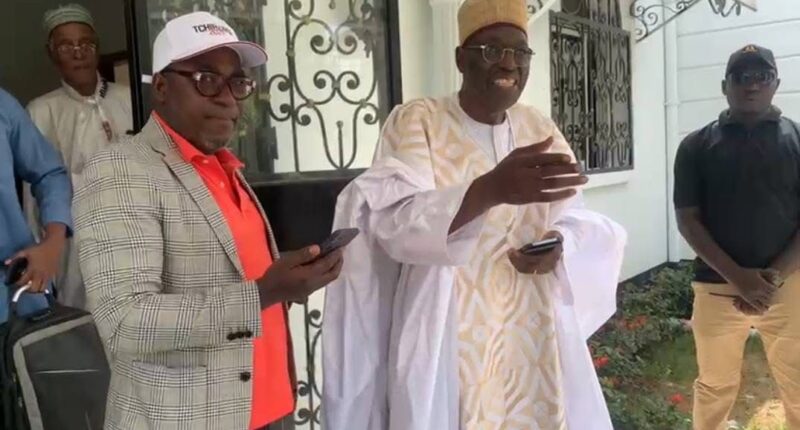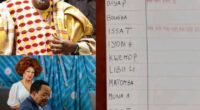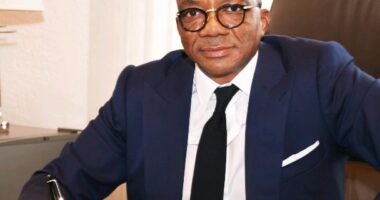Agbor Balla’s Endorsement of Issa Tchiroma: A Noble Gesture or a Dangerous Compromise in Cameroon’s Fractured Political Landscape?
By James Agbor BaretaNews October 10, 2025
In a move that has sent shockwaves through Cameroon’s political circles, renowned human rights advocate Barrister Nkongho Felix Agbor, popularly known as “Agbor Balla,” has thrown his weight behind Issa Tchiroma Bakary’s bid for the presidency in the upcoming 2025 elections. The endorsement, issued today from Garoua, frames Tchiroma as a beacon of reconciliation and renewal, praising his recent apology to Anglophones as a “courageous and humane act of leadership.” While Agbor Balla’s statement invokes themes of unity, humility, and institutional reform, it raises profound questions about authenticity, accountability, and the true path to resolving Cameroon’s deep-seated crises—particularly the ongoing Anglophone conflict that has claimed thousands of lives and displaced hundreds of thousands since 2016.
The Endorsement: A Call for Renewal or Political Opportunism?
Agbor Balla’s declaration positions the 2025 election as a “crossroads between the politics of division and the promise of renewal.” He lauds Tchiroma’s vision for a transitional government focused on healing, reconciliation, and rebuilding trust, emphasizing that this is “not a quest for power” but a “call for restoration.” On the surface, this aligns with Agbor Balla’s long-standing advocacy for dialogue and justice. As the founder of the Centre for Human Rights and Democracy in Africa and a former leader of the Cameroon Anglophone Civil Society Consortium (CACSC), Agbor Balla has been a vocal critic of the Biya regime’s handling of the Anglophone crisis. His arrest in 2017 during peaceful protests and subsequent detention made him a symbol of resistance against marginalization and human rights abuses in the English-speaking regions.
Yet, endorsing Tchiroma—a figure deeply entangled in the very system Agbor Balla has fought against—feels like a jarring pivot. Tchiroma, who served as Minister of Communication from 2009 to 2019 under President Paul Biya, was the government’s mouthpiece during the early years of the Anglophone crisis. He infamously denied the existence of an “Anglophone problem,” dismissing grievances as fabrications while defending military crackdowns and even the infamous internet blackout in the Northwest and Southwest regions. His recent apology, delivered during a campaign rally in Bamenda just days ago, has been met with skepticism by many Anglophones, who view it as a calculated election ploy rather than genuine remorse.
Agbor Balla describes the apology as transcending politics, a demonstration of “humility and moral clarity.” But critics argue it comes too late and lacks substance. As one observer noted, Tchiroma’s contrition only surfaced after his resignation from the government in June 2025, when he abruptly positioned himself as an opposition “consensus candidate” challenging Biya’s “one-man rule.” This shift has deepened rifts within the opposition, with figures like Maurice Kamto’s camp questioning Tchiroma’s credibility. Is this endorsement a pragmatic step toward inclusive dialogue, or does it risk legitimizing a man whose hands are stained by years of complicity in the regime’s atrocities?
Historical Context: Tchiroma’s Checkered Legacy and the Anglophone Struggle
To fully dissect this endorsement, one must revisit Tchiroma’s political trajectory. Born in 1949, Issa Tchiroma Bakary rose through the ranks as a railway engineer before entering politics, founding the Front for the National Salvation of Cameroon (FSNC) and aligning with Biya’s ruling Cameroon People’s Democratic Movement (CPDM). His tenure as Minister of Employment and Vocational Training, followed by Communication, was marked by unwavering loyalty to the regime. During the Anglophone crisis, he repeatedly downplayed reports of military abuses, labeling them as “distortions” that “hurt the consciences” of citizens—words he now echoes in his apology.
Tchiroma’s promises of prosperity, prisoner releases, and a roundtable on the crisis sound appealing, but they echo unfulfilled pledges from past regimes. Detractors point to his history of opportunism: once a staunch defender of Biya, he now criticizes the CPDM as a “broken” system, claiming Cameroonians are “tired” of it. As BaretaNews has previously argued, such apologies from former insiders often serve as campaign stunts, distracting from demands for true accountability, including investigations into war crimes committed in Ambazonia.
Agbor Balla’s involvement adds another layer of complexity. A steadfast advocate for federalism and peaceful resolution, he has urged youth voter registration and emphasized civic duty. However, this endorsement could alienate hardline separatists who see any engagement with Yaoundé-aligned figures as a betrayal. BaretaNews, which has long documented the regime’s biases and the unyielding fight for Ambazonian self-determination, views this as potentially diluting the struggle. By backing Tchiroma, Agbor Balla risks fracturing the Anglophone front, where unity has been key to amplifying calls for international intervention and justice.
Implications for 2025: Unity or Division?
Agbor Balla insists his support is “anchored in principle,” not partisanship, urging Cameroonians to focus on a “new Cameroon united in diversity.” Proponents might argue that Tchiroma’s transitional proposal offers a viable bridge to reform, especially given his northern roots and potential to appeal across ethnic lines. In a country plagued by ethno-political tensions, such cross-regional alliances could foster dialogue.
But the risks are stark. Endorsing a figure like Tchiroma could undermine the credibility of human rights advocates, signaling that apologies alone suffice without reparations or trials for past wrongs. It may also embolden the regime by sowing confusion in opposition ranks, as seen in recent social media debates where some label Tchiroma a “distractor” rather than a liberator. For Ambazonians, who have endured separatist attacks on education and infrastructure alongside government repression, this feels like a step backward.
In conclusion, while Agbor Balla’s endorsement may stem from a genuine desire for peace, it demands scrutiny. Cameroon’s renewal cannot be built on selective amnesia. True progress requires holding figures like Tchiroma accountable, not elevating them. As the 2025 polls approach, Anglophones must weigh whether this alliance advances justice or perpetuates the cycle of division. BaretaNews will continue monitoring these developments, amplifying voices from the ground in the pursuit of a free and equitable Ambazonia





